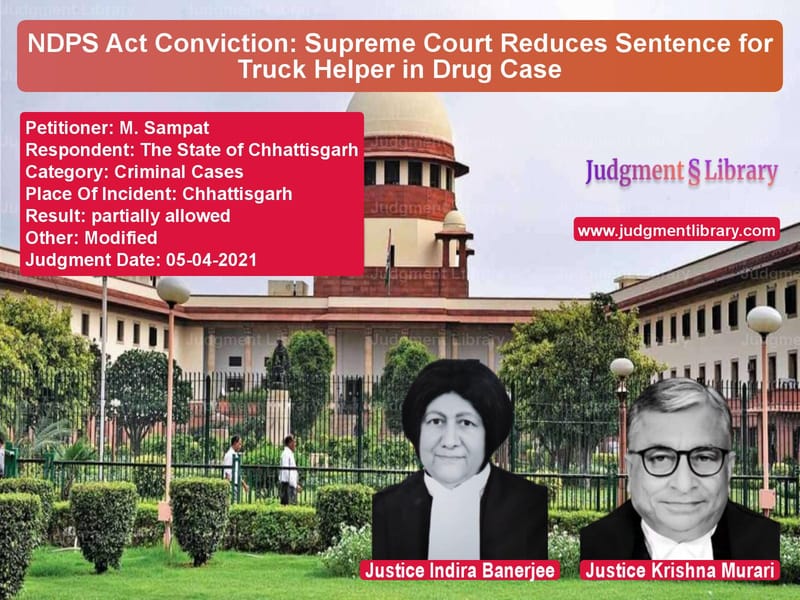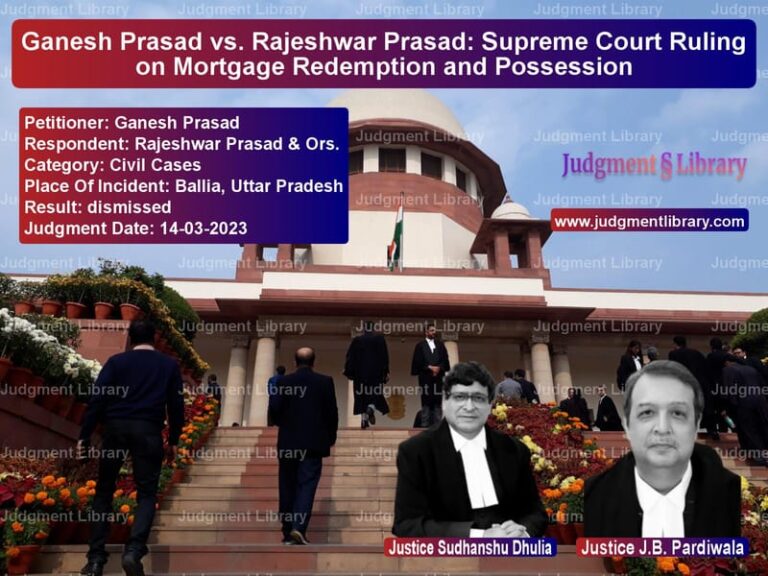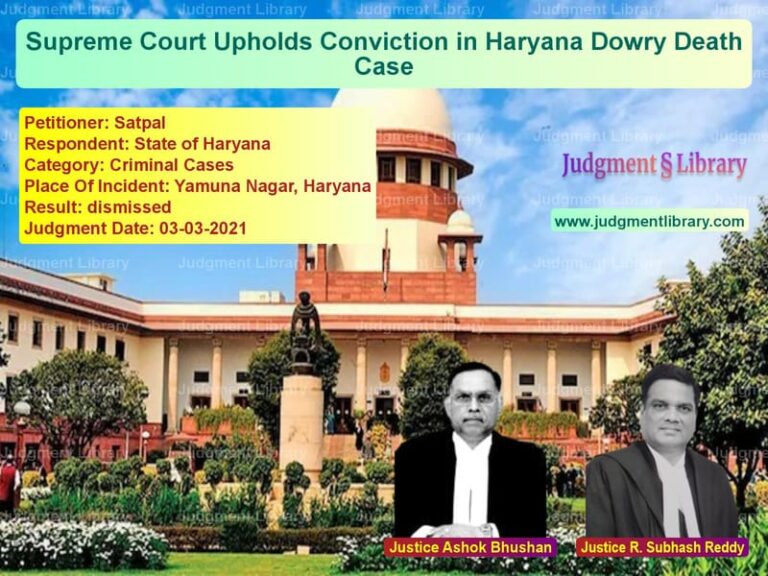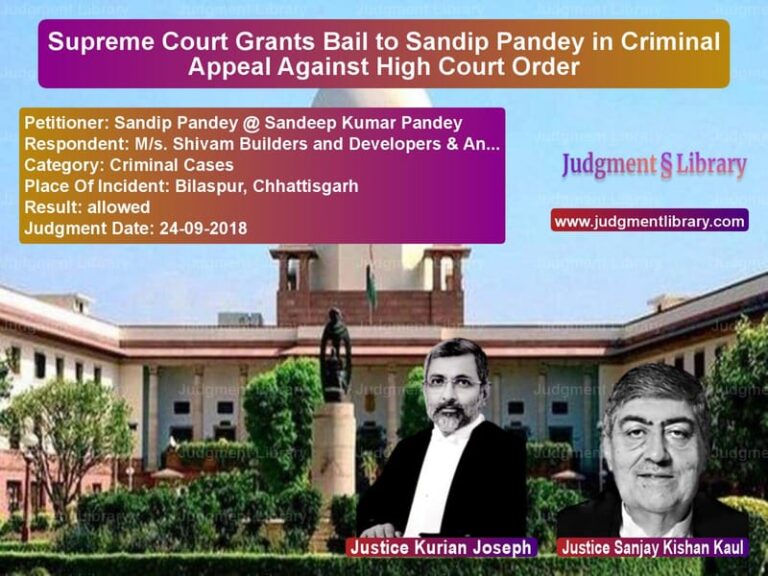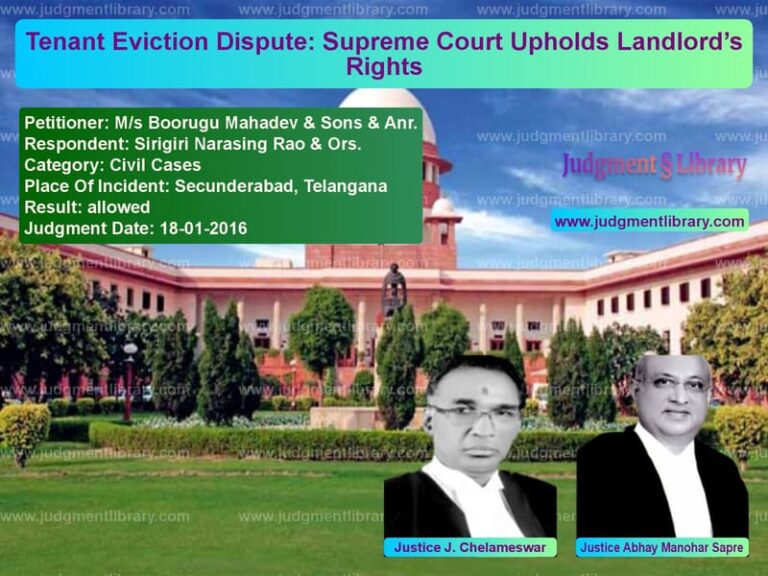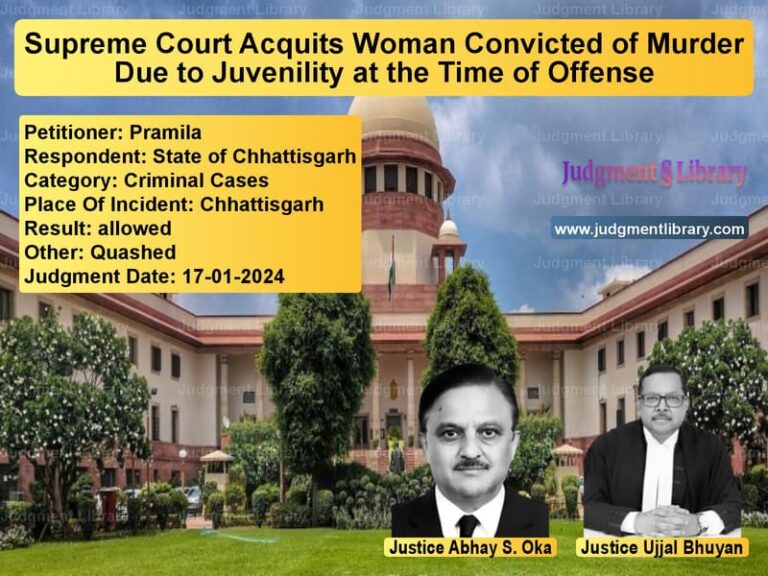NDPS Act Conviction: Supreme Court Reduces Sentence for Truck Helper in Drug Case
The case of M. Sampat vs. The State of Chhattisgarh highlights the complexities of the Narcotic Drugs and Psychotropic Substances Act, 1985 (NDPS Act) in India. This appeal before the Supreme Court arose from a conviction under Section 20(b)(ii)(C) of the NDPS Act, which pertains to the illegal transportation of narcotic substances. The Court examined the role of the appellant, a truck helper, in a case involving the transportation of over 3,300 kilograms of Ganja and ultimately reduced his sentence to the period already served.
Background of the Case
On September 14, 2009, the police in Chhattisgarh received a tip-off about a Maruti Omni van and a truck transporting a large quantity of Ganja (cannabis). Three individuals in the van were apprehended with 26 kilograms of Ganja, but were later acquitted.
The authorities then intercepted a truck with the registration number 38 L 999. The driver of the truck, T. Narsaiya, attempted to flee but was captured, while the appellant, M. Sampat, was found in the vehicle.
Seizure of the Narcotic Substance
A search of the truck revealed 3,327 kilograms of Ganja concealed under bags of onions. Both T. Narsaiya (driver) and M. Sampat (helper/conductor) were arrested and charged under the NDPS Act.
Trial Court Judgment
The Special Judge (NDPS Act), Bastar, Jagdalpur, found both accused guilty under Section 20(b)(ii)(C) and sentenced them to:
- 20 years of rigorous imprisonment
- A fine of Rs. 2 lakhs
- An additional 3 years of imprisonment in case of default in paying the fine
Both accused appealed against the conviction. However, during the proceedings, T. Narsaiya (driver) passed away, leaving only the appellant, M. Sampat, to contest the verdict.
High Court’s Decision
The High Court of Chhattisgarh at Bilaspur upheld the conviction but reduced the sentence:
- 15 years of rigorous imprisonment instead of 20
- Fine reduced to Rs. 1 lakh
The High Court found that while the conviction was justified, the maximum punishment was not warranted.
Petitioner’s Arguments
The appellant, represented by Amicus Curiae Priyanjali Singh, argued:
- He was merely a truck helper (conductor) and had no control over the cargo.
- He was only 22-23 years old at the time of the incident and came from an indigent background.
- There was no direct evidence proving his knowledge of the illegal cargo.
- Unlike the driver, he made no attempt to escape when the police intercepted the truck.
- The owner of the truck was absconding, and the real masterminds behind the smuggling operation were never caught.
Respondent’s Arguments
The State of Chhattisgarh, represented by Dr. Rakesh Pandey, argued:
- The appellant was present in the truck carrying a large quantity of Ganja.
- Under Section 20(b) of the NDPS Act, possession or transportation of narcotics carries severe penalties.
- The sheer quantity of Ganja (3,327 kg) was enough to presume knowledge of the illegal activity.
- The law provides for strict liability, meaning that anyone in possession or transportation of narcotics is deemed guilty unless proven otherwise.
Supreme Court’s Findings
The Supreme Court, comprising Justices Indira Banerjee and Krishna Murari, noted the following key points:
1. No Direct Evidence of Appellant’s Role
The Court acknowledged that while the appellant was present in the truck, there was no direct evidence proving his active involvement in the smuggling operation.
2. Extenuating Circumstances
The Court considered the following mitigating factors:
- The appellant was not the owner of the truck.
- Unlike the driver, he made no attempt to flee from the police.
- He was a first-time offender with no previous criminal record.
- He was an indigent laborer earning a minimal wage.
3. Failure of the Trial Court to Provide Justification for Maximum Sentence
The Supreme Court criticized the Trial Court for imposing the maximum 20-year sentence without stating any specific reasons. The Court observed:
“The Trial Court neither considered the extent of involvement of the appellant nor whether there were any extenuating circumstances for imposing a lesser punishment.”
Judgment and Conclusion
The Supreme Court modified the sentence as follows:
- Sentence reduced to the period already served (more than 10 years).
- The appellant was ordered to be released immediately.
- The fine of Rs. 1 lakh was upheld.
The Court concluded:
“Considering the facts and circumstances of the case, particularly that the appellant was an indigent helper on a truck, only 22/23 years of age at the time of the incident, and a first-time offender, we deem it appropriate to reduce the sentence of imprisonment to the period already undergone.”
With this ruling, the Supreme Court reinforced the principle that sentencing under the NDPS Act must be proportionate to the role of the accused, ensuring that those with minimal involvement are not unfairly subjected to maximum punishment.
Read also: https://judgmentlibrary.com/mukhtar-ansaris-custody-supreme-court-orders-transfer-to-uttar-pradesh/
Petitioner Name: M. Sampat.Respondent Name: The State of Chhattisgarh.Judgment By: Justice Indira Banerjee, Justice Krishna Murari.Place Of Incident: Chhattisgarh.Judgment Date: 05-04-2021.
Don’t miss out on the full details! Download the complete judgment in PDF format below and gain valuable insights instantly!
Download Judgment: m.-sampat-vs-the-state-of-chhatti-supreme-court-of-india-judgment-dated-05-04-2021.pdf
Directly Download Judgment: Directly download this Judgment
See all petitions in Drug Possession Cases
See all petitions in Judgment by Indira Banerjee
See all petitions in Judgment by Krishna Murari
See all petitions in partially allowed
See all petitions in Modified
See all petitions in supreme court of India judgments April 2021
See all petitions in 2021 judgments
See all posts in Criminal Cases Category
See all allowed petitions in Criminal Cases Category
See all Dismissed petitions in Criminal Cases Category
See all partially allowed petitions in Criminal Cases Category

